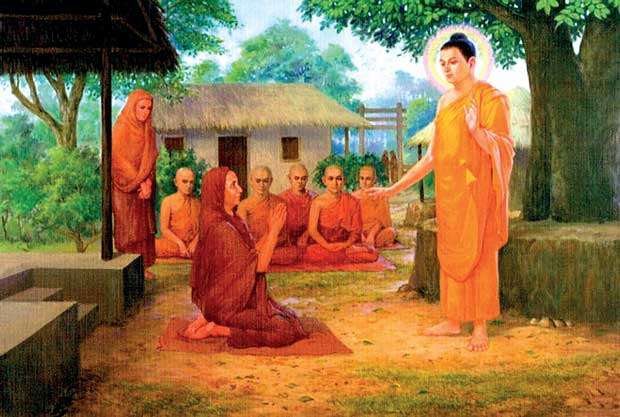Reply To:
Name - Reply Comment
Last Updated : 2024-04-24 19:15:00

The Buddha’s open invitation for women to participate in the Sasana by making them eligible to enter the Bhikkuni Sangha– with ample opportunities for public life had  greatly improved the status of women. In Islamic and Hindu societies a number of books have been authored on the changing status of women, but strangely little in Buddhism—apart from Miss I.B. Horner, Pali scholar, who wrote the book titled, Women under Primitive Buddhism, in 1930. The Buddha’s teachings undoubtedly have the least biased approach against women. Their importance to society was acknowledged very much enhancing their standing among men.
greatly improved the status of women. In Islamic and Hindu societies a number of books have been authored on the changing status of women, but strangely little in Buddhism—apart from Miss I.B. Horner, Pali scholar, who wrote the book titled, Women under Primitive Buddhism, in 1930. The Buddha’s teachings undoubtedly have the least biased approach against women. Their importance to society was acknowledged very much enhancing their standing among men.
Jambudweepa’s Binara-malees -Maha Prajapati and Theri Kundalakesi
They were admitted to Sasana as Bhikkhunis on Binara Poya.
The haunting beauty of maestro Amaradeva’s melodious voice singing Dalton Alwis’ lines based on Kundalakesi in an adaptation of the story of Mehenni (female monk); the scintillating song with its own magical impact gives immense and delicate joy
‘Neela warala nil chamara pawan salanni…kundalakesi… kundalakesi’
Protagonist Kundalakesi (Woman with curls) whose birth name is Badra, was born in a business family in the city of Puhar.
After losing her mother during childhood, Badra lives a sheltered life. One day, from her balcony she spotted a bandit being paraded before execution in her hometown; and it was love at first sight. As she fell in love, Bhadra begged her father to save the thief, named Kaalan, who had been sentenced to death for banditry. Strangely, the father obliges, he appeals to the king for the bandit’s release, for which he had to pay the treasury in gold [Kaalan’s weight] and 81 elephants. [Fathers in the time of Buddha—broad-minded and loved their daughters so much that they were obliged to make them happy at any cost or were they stupid, idiotic and lacked good judgment and careful thought, is something that warrants socio-historical profound research on] Badra alias Kundalakesi married Kaalan but did they live happily ever after?
She loved her former bandit husband very much; One day, she teasingly refers to the husband as a thief. This angers the temperamental Kaalan who was marking time for an opportunity to satisfy his inbred craving for valuables. His attraction to her jewellery motivates him; he decides to kill his wife and suggests visiting the peak of a nearby hill.
The rogue coaxed her to wear of her expensive jewellery and accompany him saying that he wanted to perform a vow at the guardian deity of the place because it was that deity who had saved him from death. Captivated by the exquisiteness of the forest, waterfalls, fauna and flora and birds singing as they trek through a jungle terrain [Those who watched the traditional style opera Kundalakesi of Mahagama Sekara fame ….would remember as it folds],the coupleforgetting all anxieties, tensions and worries sings that heart-warming Sekara lyrics to melodious rhythm of Somadasa Alwitigala—
“Sundara me wana thulma yahan geba // aadara bas kiyana…Handa devi dekan pinana… Anna balan sanda ran ketiyen ena seethe sunil dahara…”
On reaching the summit, he declares his plan to rob her of all the jewellery that he enticed her to wear on the journey and kill her. Kundalakesi is shaken but wisdom arose in her and pleaded with him to grant a final wish — that she wishes to pay reverence to her husband by going around him three times before she dies. He grants her wish when she gets behind him, Kundalakesi moves forward and pushed him off the summit.
Admission of Nuns- Bhikkhuni Order
The most important happening on Binara Poya day was the admission of Nuns to the Sasana or founding of the Bhikkuni Order. The Buddha allowed the admission of female candidates to the order following Maha Prajapati Gotami’s commitment and determination in making several requests. Prajapati Gotami, a role model for women-folk was the sister of Queen Mahamaya, Buddha’s mother..
The Buddha’s judgment in the fifth year after his enlightenment in sanctioning the establishment of an Order for women was stained by the inclusion of garudhammas imposed on them. Incorporated in the Bhikkhuni Vinaya the rules are nothing but attachments by male chauvinists later. It is a blatant subordination of Bhikkhunis to Bhikkhus.
The Buddha during this time was residing at Nigrodharamaya in Kapilavasthu when she approached him and requested consent for women to enter the Sasana.
The Buddha after turning down the request three times finally allowed the admission to the order on ‘conditions’ they say. It was granted on a Binara full moon Day. Among prejudiced religious practices, Buddhism can definitely claim to have the least prejudices against women.
‘What does womanhood matter at all, when the mind is concentrated well when knowledge flows on steadily as one sees correctly into Dhamma. One to whom it might occur, ‘I am a woman’ or ‘I am a man’ or ‘I’m anything at all’ is fit for Mara to address.. – Nun Sona verses Mara. Garudhamma-- Male Chauvinist attachments
In Asian Buddhist societies, in spite of the objectives of the Buddha, controlling is done by men. The approach of people in a system found, virtually every faction of Buddhism seems to have fashioned a level of gender bias. This resulted in the loss of female monks in both traditions. The Buddha enlightened us on generally accepted concepts like ‘against the stream.’
The so-called Garudhamma convention, an ‘approval’ of women’s inferior competence, are yet to be fully scrutinized.
The proclamation that a woman cannot become a Buddha was in all probability rather a gentle opinion, carrying no significant consequence on prospects of women practitioners.
They only promote gender bias and not Buddhism. The Mahayanists, in contrast, believe women possess an equal capability for development on the path to achieve awakening.
“O Gotami”, said the blessed one, “perform a miracle in order to answer the misconceptions of those badly informed men who do not recognize the spiritual abilities of women”.
The Buddha after turning down the request three times finally allowed the admission to the order on ‘conditions’ they say. It was granted on a Binara full moon Day. Among prejudiced religious practices, Buddhism can definitely claim to have the least prejudices against women.
The above statement contradicts Garudhammas, which is an obvious imagination of Male Chauvinists.
The Buddha’s judgment in the fifth year after his enlightenment in sanctioning the establishment of an Order for Women was stained by the inclusion of garudhammas imposed on them. Incorporated in the Bhikkhuni Vinaya the rules are nothing but attachments by male chauvinists later. It is a blatant subordination of Bhikkhunis to Bhikkhus.
Rule number four recognized the intimidation to which Bhikkhunis would be exposed. Concessions to male superiority are seen in Rules 1 and 8. Rule 1 has been the most annoying in practical terms and obviously embarrassing in societies where the salutation practice was strict. Why should a Bhikkhuni always pay respect to a Bhikkhu however junior the latter may have been? Chronicle says Prajâpati Gotami sought an exemption from this rule that but was unsuccessful, despite Ananda Thera’s support. Evidently, they are not backed by Buddha’s idea or conception.
The eight rules are--
1. Irrespective of any other considerations like seniority and age, Bhikkhus to have precedence over Bhikkhunis in matters of salutation
2. Bhikkhunis has to observe the annual vassana in a district where there were Bhikkhus.
3. It is the male Bhikkhus who set the dates for Bhikkhuni Uposatha.
4. An assembly of both Bhikkhus and Bhikkhunis is a must when Confessing lapses by Bhikkhuni.
5. Both the Sanghas to undertake Judicial processes in case of Bikkhunis.
6. Upasampada commencement of Bhikkhunis to be given by the Bhikkhu Sangha too.
7. A Bhikkhuni should never abuse a Bhikkhu.
8. Bhikkhunis to be admonished by Bhikkhus, but not vice versa.
Kundalakesi, being guilty of matricide, and regretful of her actions in killing her husband, she leaves all her jewellery in the zenith of the hill and enters the city where she became to be known as Jambuka Paribbajika as she walked extensively in Jambudweepa, she even challenged anyone to compete.
Kundalakesi meets Sariputta Thera in Sravasti, and begs him to teach her the Dhamma. Sariputta wanted her to become a Bhikkhuni; she was ordained Theri Kundalakesi on Binara full moon. She gained arhantship in a very short time and engaged in spreading the Buddha Dhamma for the rest of her life. The puzzled Bhikkhus asked the Buddha, “how come a woman who killed her husband achieve the status; to achieve supreme bliss after listening to the Dhamma only so little?”
The Buddha said:
“Better than the recitation of a hundred verses, that are senseless and unconnected with the realization of Nibbana, is the recitation of a single verse of the Dhamma, if on hearing it, one is calmed”
Compassion and Understanding
It was through the realisation that the Buddha rediscovered the true Dhamma!. That he felt disillusion with this round of rebirth; that he fully understood other being’s suffering; that he himself crossed over the flood to Nibbāna; that he became his own final and absolute helper. He gained majestic dignity as a worthy Buddha; he remained detached from all being’s craving; his own mind was detached from all phenomena....!
For just as the Blessed One’s compassion was without biased sentimental fondness, so was his supreme realization free from the concepts of ‘I’ ‘Me’ and ‘Mine’... let alone Sinhala, Tamil, Muslim, Buddhist, Hindu, Christian…caste, creed, race— an untold misery of mythological Divisions! There is just a single category of Humans...They are Homo sapiens!
The writer can be contacted at kksperera1@gmail.com

Add comment
Comments will be edited (grammar, spelling and slang) and authorized at the discretion of Daily Mirror online. The website also has the right not to publish selected comments.
Reply To:
Name - Reply Comment
US authorities are currently reviewing the manifest of every cargo aboard MV
On March 26, a couple arriving from Thailand was arrested with 88 live animal
According to villagers from Naula-Moragolla out of 105 families 80 can afford
Is the situation in Sri Lanka so grim that locals harbour hope that they coul